-
 In the first part of this study the authors present the advantages of parties’ representation through a lawyer, namely through a legal adviser. They’re also showing the solutions promoted in comparative law in this matter, noting that the principle of European law is that of mandatory parties’ representation by a lawyer. Authors’ approach materializes in a comprehensive analysis of the new Code of Civil Procedure provisions concerning parties’ to the appeal mandatory representation through a lawyer or legal adviser. In the authors’ opinion this requirement is aimed not only at the appellant, but also at the intimate. Individual reflections are also formulated in terms of the representation of the parties in withdrawal extraordinary remedy at law, namely the appeal for annulment and revision. The provisions of the law regarding the measures for relieving courts and preparing the implementation of Law no. 134/2010 regarding the Code of Civil Procedure are also analyzed, summarized in the final part of the study. This normative act contains a particular provision on judicial and prosecutor offices’ representation in court. The authors opinion that the procedural rule subject to the analysis takes into account the representation of courts and prosecutors offices in the event that they participate on their own behalf in the substantive law report.
In the first part of this study the authors present the advantages of parties’ representation through a lawyer, namely through a legal adviser. They’re also showing the solutions promoted in comparative law in this matter, noting that the principle of European law is that of mandatory parties’ representation by a lawyer. Authors’ approach materializes in a comprehensive analysis of the new Code of Civil Procedure provisions concerning parties’ to the appeal mandatory representation through a lawyer or legal adviser. In the authors’ opinion this requirement is aimed not only at the appellant, but also at the intimate. Individual reflections are also formulated in terms of the representation of the parties in withdrawal extraordinary remedy at law, namely the appeal for annulment and revision. The provisions of the law regarding the measures for relieving courts and preparing the implementation of Law no. 134/2010 regarding the Code of Civil Procedure are also analyzed, summarized in the final part of the study. This normative act contains a particular provision on judicial and prosecutor offices’ representation in court. The authors opinion that the procedural rule subject to the analysis takes into account the representation of courts and prosecutors offices in the event that they participate on their own behalf in the substantive law report. -
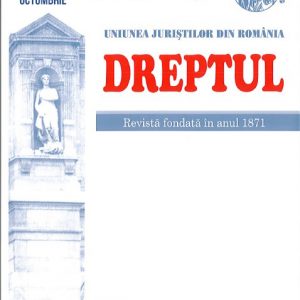 The legal report between the commercial company and the administrator is a report of mandate. The administrator mandate can be with representation or without representation and has contractual content and also legal one. The powers of the administrator of the company include two elements: the power to fulfil management abilities; the power to represent if it was expressly granted. The power to represent is distinct from the power of administration and exists only if it has been conferred. The representation of the company by the administrator is exercised differently depending on the type of company. For concluding the dispositions, the company’s administrator does not need a special power of attorney in the authentic form for this purpose. When the acts concluded by the representatives of the company are done with the overcoming of its object, they are the duty of the company except in the cases when the third parties knew or should have known the overcoming of the object or when the acts of the same are concluded by exceeding the limits of the powers of the respective bodies.
The legal report between the commercial company and the administrator is a report of mandate. The administrator mandate can be with representation or without representation and has contractual content and also legal one. The powers of the administrator of the company include two elements: the power to fulfil management abilities; the power to represent if it was expressly granted. The power to represent is distinct from the power of administration and exists only if it has been conferred. The representation of the company by the administrator is exercised differently depending on the type of company. For concluding the dispositions, the company’s administrator does not need a special power of attorney in the authentic form for this purpose. When the acts concluded by the representatives of the company are done with the overcoming of its object, they are the duty of the company except in the cases when the third parties knew or should have known the overcoming of the object or when the acts of the same are concluded by exceeding the limits of the powers of the respective bodies. -

-
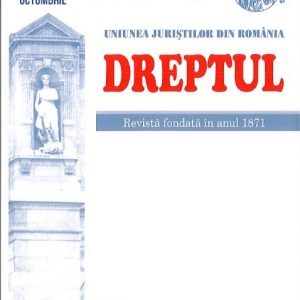 The study deals with the particularities of the human medically assisted reproduction in the cross-border private relationships. Among the artificial procreation techniques, surrogate motherhood is of present interest, as a result of the multiplication of the requests for recognition, on the territory of the forum, of the foreign judgments which establish the filiation of the child born abroad. The implications of private international law are tangential to the qualification, to the conflicts of laws in time and space and to the effectiveness of the foreign judgments. The heterogeneity of the national regulations is the main factor creating non-unitary case laws and different practices – some of them, questionable. The context of the analysis does not allow the dissociation of the artificial procreation from the higher interest of the child, so that any de lege lata or de lege ferenda solutions must be examined through the filter of this fundamental principle.
The study deals with the particularities of the human medically assisted reproduction in the cross-border private relationships. Among the artificial procreation techniques, surrogate motherhood is of present interest, as a result of the multiplication of the requests for recognition, on the territory of the forum, of the foreign judgments which establish the filiation of the child born abroad. The implications of private international law are tangential to the qualification, to the conflicts of laws in time and space and to the effectiveness of the foreign judgments. The heterogeneity of the national regulations is the main factor creating non-unitary case laws and different practices – some of them, questionable. The context of the analysis does not allow the dissociation of the artificial procreation from the higher interest of the child, so that any de lege lata or de lege ferenda solutions must be examined through the filter of this fundamental principle. -
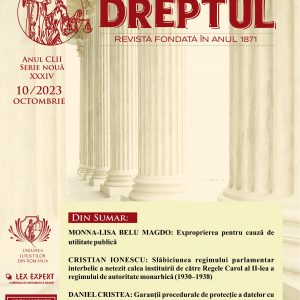
-
 In this study, by analyzing the legal issues of the respect due to persons also after their death, the author, after proceeding to a comparative law examination in the matter, further makes a study of the Romanian legislation in the field under debate (mainly, Articles 78–81 of the new Romanian Civil Code, as well as other legal provisions written down in special laws, such as: the Law No 95/2006 on the reform in the field of healthcare, the Law No 104/2003 on handling of human dead bodies and removal of organs and tissues from the dead bodies in view of transplant and others).
In this study, by analyzing the legal issues of the respect due to persons also after their death, the author, after proceeding to a comparative law examination in the matter, further makes a study of the Romanian legislation in the field under debate (mainly, Articles 78–81 of the new Romanian Civil Code, as well as other legal provisions written down in special laws, such as: the Law No 95/2006 on the reform in the field of healthcare, the Law No 104/2003 on handling of human dead bodies and removal of organs and tissues from the dead bodies in view of transplant and others). -
 Potrivit art. 10 C.pr.pen. alin. (1), părțile și subiecții procesuali principali au dreptul de a se apăra ei înșiși sau de a fi asistați de avocat; în alin. (2) al aceluiași articol se prevede că părțile, subiecții procesuali principali și avocatul au dreptul să beneficieze de timpul și înlesnirile necesare pregătirii apărării; apoi, în alin. (3) se arată că suspectul are dreptul de a fi informat de îndată și înainte de a fi ascultat despre fapta pentru care se efectuează urmărirea penală și încadrarea juridică a acesteia. Inculpatul are dreptul de a fi informat de îndată despre fapta pentru care s-a pus în mișcare acțiunea penală împotriva lui și încadrarea juridică a acesteia, [...]; în sfârșit, în alin. (5) se prevede că organele judiciare au obligația de a asigura exercitarea deplină și efectivă a dreptului la apărare de către părți și subiecții procesuali principali în tot cursul procesului penal.
Potrivit art. 10 C.pr.pen. alin. (1), părțile și subiecții procesuali principali au dreptul de a se apăra ei înșiși sau de a fi asistați de avocat; în alin. (2) al aceluiași articol se prevede că părțile, subiecții procesuali principali și avocatul au dreptul să beneficieze de timpul și înlesnirile necesare pregătirii apărării; apoi, în alin. (3) se arată că suspectul are dreptul de a fi informat de îndată și înainte de a fi ascultat despre fapta pentru care se efectuează urmărirea penală și încadrarea juridică a acesteia. Inculpatul are dreptul de a fi informat de îndată despre fapta pentru care s-a pus în mișcare acțiunea penală împotriva lui și încadrarea juridică a acesteia, [...]; în sfârșit, în alin. (5) se prevede că organele judiciare au obligația de a asigura exercitarea deplină și efectivă a dreptului la apărare de către părți și subiecții procesuali principali în tot cursul procesului penal. -
 The regulation (Article 227) of the new Criminal Procedure Code has a partial correspondent in the provisions of Article 146 paragraphs 8 and 111 and Article 1491 paragraphs 9 and 12 of the previous Criminal Procedure Code (1968). The authors analyze the institution of rejection of the proposal of preventive arrest of the defendant during the criminal prosecution, presenting some critical issues and proposing some improvements to the new regulation.
The regulation (Article 227) of the new Criminal Procedure Code has a partial correspondent in the provisions of Article 146 paragraphs 8 and 111 and Article 1491 paragraphs 9 and 12 of the previous Criminal Procedure Code (1968). The authors analyze the institution of rejection of the proposal of preventive arrest of the defendant during the criminal prosecution, presenting some critical issues and proposing some improvements to the new regulation. -
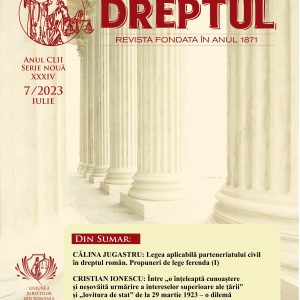
-
 Cum debitorul obligației de întreținere a executat în natură obligația, nu mai există temei pentru care el să fie ținut, ca pentru aceeași perioadă, să execute și prin plata sumei de bani stabilite prin hotărârea judecătorească, situație care se menține până când s-ar pune în executare hotărârea judecătorească prin care domiciliul minorei este stabilit la mamă, dată de când obligația ar deveni exigibilă. (Tribunalul Galați, Decizia civilă nr. 592 din 21 mai 2021, definitivă)
Cum debitorul obligației de întreținere a executat în natură obligația, nu mai există temei pentru care el să fie ținut, ca pentru aceeași perioadă, să execute și prin plata sumei de bani stabilite prin hotărârea judecătorească, situație care se menține până când s-ar pune în executare hotărârea judecătorească prin care domiciliul minorei este stabilit la mamă, dată de când obligația ar deveni exigibilă. (Tribunalul Galați, Decizia civilă nr. 592 din 21 mai 2021, definitivă) -
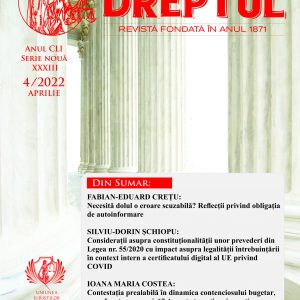 At the same time with the entry into force of the Law No 85/2014 on the procedures for preventing insolvency and for insolvency, it has been also regulated indirectly the refund of the judicial stamp duty to the plaintiff who invested a court of law with a litigation against the defendant-debtor against whom a final interlocutory judgment to open the insolvency procedure had not been pronounced until the moment of bringing the action by means of common law. This study analyses the differences of approach between the old insolvency law and the regulation in force since 2014, by pointing out how the legislator decided to solve the issue of lis pendens created by simultaneously analyzing the same application within two separate procedures: the general one, before the common law court, and the special one, before the syndic judge. The study also analyses the implications of good faith, respectively of the guilt of the plaintiff who makes use of this application, with discussions on the moment, the manner of requesting the refund of the stamp duty, respectively of the amount whose refund may be ordered.
At the same time with the entry into force of the Law No 85/2014 on the procedures for preventing insolvency and for insolvency, it has been also regulated indirectly the refund of the judicial stamp duty to the plaintiff who invested a court of law with a litigation against the defendant-debtor against whom a final interlocutory judgment to open the insolvency procedure had not been pronounced until the moment of bringing the action by means of common law. This study analyses the differences of approach between the old insolvency law and the regulation in force since 2014, by pointing out how the legislator decided to solve the issue of lis pendens created by simultaneously analyzing the same application within two separate procedures: the general one, before the common law court, and the special one, before the syndic judge. The study also analyses the implications of good faith, respectively of the guilt of the plaintiff who makes use of this application, with discussions on the moment, the manner of requesting the refund of the stamp duty, respectively of the amount whose refund may be ordered. -
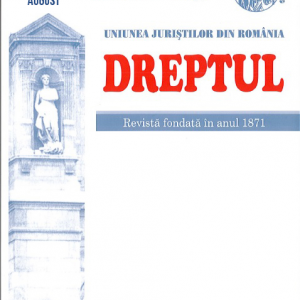 The author, after making a brief history on the taxation of the registration of motor vehicles in Romania, after our country joined the European Union (1 January 2007), expresses her opinion that even the last regulation in this matter (the Government Emergency Ordinance No 9/2013 on the environmental stamp for motor vehicles), being contrary to the provisions of Article 110 of the Treaty on the Functioning of the European Union, can not be legally applied in Romania, thus violating the principle of supremacy of the European law over the national law (in this case, the Romanian law).
The author, after making a brief history on the taxation of the registration of motor vehicles in Romania, after our country joined the European Union (1 January 2007), expresses her opinion that even the last regulation in this matter (the Government Emergency Ordinance No 9/2013 on the environmental stamp for motor vehicles), being contrary to the provisions of Article 110 of the Treaty on the Functioning of the European Union, can not be legally applied in Romania, thus violating the principle of supremacy of the European law over the national law (in this case, the Romanian law). -
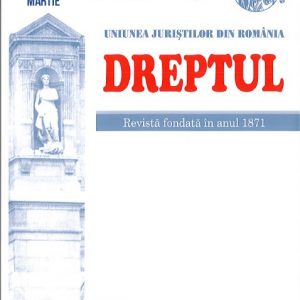 În acest număr al revistei publicăm două interesante studii semnate de eruditul dascăl de drept civil Dimitrie Alexandresco în publicația „Curierul judiciar” din 28 mai 1900 și, respectiv, de profesorul Vintilă Dongoroz, în aceeași revistă, nr. 11/1942. În primul articol, profesorul Dimitrie Alexandresco abordează o temă de drept internațional privat, și anume efectele gestiunii de afaceri în situația în care aceasta este încheiată pentru a-și produce efectele într-o altă țară decât cea de care aparțin părțile. Profesorul Alexandresco răspunde la întrebarea: „Care este legea după care se vor aprecia condițiile intrinseci de validitate și efectele acestui cvasi-contract?”. În al doilea articol, profesorul Vintilă Dongoroz prezintă o problemă de drept procesual penal referitoare la cererea de strămutare pentru legitimă suspiciune a unei cauze penale aflate în faza de cercetare la judecătorul de instrucție.
În acest număr al revistei publicăm două interesante studii semnate de eruditul dascăl de drept civil Dimitrie Alexandresco în publicația „Curierul judiciar” din 28 mai 1900 și, respectiv, de profesorul Vintilă Dongoroz, în aceeași revistă, nr. 11/1942. În primul articol, profesorul Dimitrie Alexandresco abordează o temă de drept internațional privat, și anume efectele gestiunii de afaceri în situația în care aceasta este încheiată pentru a-și produce efectele într-o altă țară decât cea de care aparțin părțile. Profesorul Alexandresco răspunde la întrebarea: „Care este legea după care se vor aprecia condițiile intrinseci de validitate și efectele acestui cvasi-contract?”. În al doilea articol, profesorul Vintilă Dongoroz prezintă o problemă de drept procesual penal referitoare la cererea de strămutare pentru legitimă suspiciune a unei cauze penale aflate în faza de cercetare la judecătorul de instrucție. -
 În acest număr al revistei publicăm două interesante studii semnate de eruditul dascăl de drept civil Dimitrie Alexandresco în publicația „Curierul judiciar” din 28 mai 1900 și, respectiv, de profesorul Vintilă Dongoroz, în aceeași revistă, nr. 11/1942. În primul articol, profesorul Dimitrie Alexandresco abordează o temă de drept internațional privat, și anume efectele gestiunii de afaceri în situația în care aceasta este încheiată pentru a-și produce efectele într-o altă țară decât cea de care aparțin părțile. Profesorul Alexandresco răspunde la întrebarea: „Care este legea după care se vor aprecia condițiile intrinseci de validitate și efectele acestui cvasi-contract?”. În al doilea articol, profesorul Vintilă Dongoroz prezintă o problemă de drept procesual penal referitoare la cererea de strămutare pentru legitimă suspiciune a unei cauze penale aflate în faza de cercetare la judecătorul de instrucție.
În acest număr al revistei publicăm două interesante studii semnate de eruditul dascăl de drept civil Dimitrie Alexandresco în publicația „Curierul judiciar” din 28 mai 1900 și, respectiv, de profesorul Vintilă Dongoroz, în aceeași revistă, nr. 11/1942. În primul articol, profesorul Dimitrie Alexandresco abordează o temă de drept internațional privat, și anume efectele gestiunii de afaceri în situația în care aceasta este încheiată pentru a-și produce efectele într-o altă țară decât cea de care aparțin părțile. Profesorul Alexandresco răspunde la întrebarea: „Care este legea după care se vor aprecia condițiile intrinseci de validitate și efectele acestui cvasi-contract?”. În al doilea articol, profesorul Vintilă Dongoroz prezintă o problemă de drept procesual penal referitoare la cererea de strămutare pentru legitimă suspiciune a unei cauze penale aflate în faza de cercetare la judecătorul de instrucție. -

-
 This study proposes an analysis of the regulation of the institution of return by right of ownership of land located in the built-up area, with particular reference to the interpretation of the provisions of Article 25 (1) of the Law No 18/1991, amended, supplemented and republished. In the thematic approach, there are presented a series of reasons meant to clarify the legal content of the terminology of the text, emphasizing the jurisprudential meaning of the syntagms used by the legislator. Thus, the notions of reconstitution, constitution and return by right of ownership are analyzed distinctly, showing that the text of law in question is incidental both in the assumption that the agricultural cooperative of production has attributed lots for use in the gardens located in the built-up area of the former owners to third parties, cooperative members who were not the owners of that land, and in the assumption that such lots were attributed to the former owners themselves, who became members of C.A.P., either on the same site, in continuation of the 250 square meters of personal property, according to the regulations of that time (the dwelling house and household dependencies, the land on which they were located and the yard), or on another site in the built-up area. Some critical remarks are made on some approaches coming from a land fund county commission, but also from the court, which, in our opinion, did not take into account the conceptual efforts of the doctrine and the judicial practice in the matter. We are convinced that reading this study will effectively contribute to the reduction to evanescence of the risk of bringing prejudice to the real protection guaranteed by the legal order in the field of establishment, defence and exercise of the legitimate rights and interests of the persons covered by this text of law.
This study proposes an analysis of the regulation of the institution of return by right of ownership of land located in the built-up area, with particular reference to the interpretation of the provisions of Article 25 (1) of the Law No 18/1991, amended, supplemented and republished. In the thematic approach, there are presented a series of reasons meant to clarify the legal content of the terminology of the text, emphasizing the jurisprudential meaning of the syntagms used by the legislator. Thus, the notions of reconstitution, constitution and return by right of ownership are analyzed distinctly, showing that the text of law in question is incidental both in the assumption that the agricultural cooperative of production has attributed lots for use in the gardens located in the built-up area of the former owners to third parties, cooperative members who were not the owners of that land, and in the assumption that such lots were attributed to the former owners themselves, who became members of C.A.P., either on the same site, in continuation of the 250 square meters of personal property, according to the regulations of that time (the dwelling house and household dependencies, the land on which they were located and the yard), or on another site in the built-up area. Some critical remarks are made on some approaches coming from a land fund county commission, but also from the court, which, in our opinion, did not take into account the conceptual efforts of the doctrine and the judicial practice in the matter. We are convinced that reading this study will effectively contribute to the reduction to evanescence of the risk of bringing prejudice to the real protection guaranteed by the legal order in the field of establishment, defence and exercise of the legitimate rights and interests of the persons covered by this text of law. -

-

-
 La 16 decembrie 2021 se împlinesc 150 de ani de când a văzut lumina tiparului primul număr al revistei „Dreptul”. Anul 1871 a avut o însemnătate aparte pentru lumea juriștilor români de atunci, marcând, pe de o parte, fondarea Societății Juridice și, pe de altă parte, apariția revistei „Dreptul”.
La 16 decembrie 2021 se împlinesc 150 de ani de când a văzut lumina tiparului primul număr al revistei „Dreptul”. Anul 1871 a avut o însemnătate aparte pentru lumea juriștilor români de atunci, marcând, pe de o parte, fondarea Societății Juridice și, pe de altă parte, apariția revistei „Dreptul”. -
 Este în afara oricărei îndoieli că tradiționala clasificare a constituțiilor în constituții rigide și în constituții suple rămâne o teză unanim admisă de către constituționaliști. Cei care critică această clasificare o fac fie din ignoranță (și aici replicile sunt inutile), fie din motive pur electorale, mai mult sau mai puțin motivate. Pentru liniștea sufletească a acestora din urmă, trebuie să se observe că doctrina constituțională explică foarte clar faptul că rigiditatea unei constituții nu se opune revizuirii sale. Rigiditatea constituțională este de fapt un procedeu tehnic (constituțional) care se legitimează prin stabilitatea în timp a constituției, ca trăsătură definitorie a acesteia. Iar stabilitatea constituției se fondează, la rândul său, pe realitatea că o constituție este o reformă, este cea mai complexă reformă, a cărei exprimare cere timp și, de ce să nu o spunem, răbdare.
Este în afara oricărei îndoieli că tradiționala clasificare a constituțiilor în constituții rigide și în constituții suple rămâne o teză unanim admisă de către constituționaliști. Cei care critică această clasificare o fac fie din ignoranță (și aici replicile sunt inutile), fie din motive pur electorale, mai mult sau mai puțin motivate. Pentru liniștea sufletească a acestora din urmă, trebuie să se observe că doctrina constituțională explică foarte clar faptul că rigiditatea unei constituții nu se opune revizuirii sale. Rigiditatea constituțională este de fapt un procedeu tehnic (constituțional) care se legitimează prin stabilitatea în timp a constituției, ca trăsătură definitorie a acesteia. Iar stabilitatea constituției se fondează, la rândul său, pe realitatea că o constituție este o reformă, este cea mai complexă reformă, a cărei exprimare cere timp și, de ce să nu o spunem, răbdare. -
 The problem of admissibility of revocation of the legal acts of labour law issued by the employer has been disputed for more than four decades. Within this framework, this study supports the affirmative solution, namely that of revocability by the employer of all its unilateral acts. Essential arguments consist in the specific nature of the labour legal relations, specific nature which excludes the application of the civil rules as rules of common law, according to Article 278 (1) of the Labour Code. While in the civil law the unilateral legal acts are, as a rule, irrevocable, in the labour law – an autonomous branch of law – the same category of acts are revocable.
The problem of admissibility of revocation of the legal acts of labour law issued by the employer has been disputed for more than four decades. Within this framework, this study supports the affirmative solution, namely that of revocability by the employer of all its unilateral acts. Essential arguments consist in the specific nature of the labour legal relations, specific nature which excludes the application of the civil rules as rules of common law, according to Article 278 (1) of the Labour Code. While in the civil law the unilateral legal acts are, as a rule, irrevocable, in the labour law – an autonomous branch of law – the same category of acts are revocable. -
 The postponing of the application of punishment is an institution recently introduced in the Criminal Code, creating problems of interpretation both in the doctrine and in the judicial practice, especially on two levels: the terminology used and the systematization of the substantive and procedural provisions in the legislation. These issues affect the institutions of the revocation and annulment of postponing the application of punishment.
The postponing of the application of punishment is an institution recently introduced in the Criminal Code, creating problems of interpretation both in the doctrine and in the judicial practice, especially on two levels: the terminology used and the systematization of the substantive and procedural provisions in the legislation. These issues affect the institutions of the revocation and annulment of postponing the application of punishment. -
 The author argues that, for repeated offense and continued criminal offense, the time of the offense, which determines reversal of the conditional suspension of execution of sentence is the first time the constituent elements of the offense were met and not when the offense was completely consummated. If the first time when the elements of the offense that enter the natural or legal unity of the repeated or continued criminal offense were met was discovered after the expiry of the trial period, the court shall not rule the reversal of the conditional suspension of execution of sentence.
The author argues that, for repeated offense and continued criminal offense, the time of the offense, which determines reversal of the conditional suspension of execution of sentence is the first time the constituent elements of the offense were met and not when the offense was completely consummated. If the first time when the elements of the offense that enter the natural or legal unity of the repeated or continued criminal offense were met was discovered after the expiry of the trial period, the court shall not rule the reversal of the conditional suspension of execution of sentence. -

-
 The scientific approach of the authors starts from the fact that, when it comes to concepts such as, for example, resilience or victimology, which can not be understood or applied without a multidisciplinary, interdisciplinary or even transdisciplinary approach (see the conclusion which the authors have reached with regard to the possibility of appearance of a new discipline, namely legal resilience), the competences of the legal science specialists, in general, and of those in the field of criminal law, in particular, together with the competences of the specialists in psychology, psychiatry, and others, are extremely important. The authors place the above-mentioned concepts on the law – psychology – psychiatry interface and they analyze them from the perspective of the criminal justice and of the relationship between the persons involved, respectively the victims of crimes (minors and adults to the same extent), with society, but also with the aggressor, both before committing the criminal act and thereafter. Moreover, with respect to resilience and victimology, after it is pointed out that they do not have unique definitions, generally-accepted, there are also revealed the essential points on which those involved in the research of these matters have agreed upon, as well as the exchange of information and of procedures performed at the the boundary between resilience and victimology. At the same time, the criminal justice is not treated under a retributive aspect, but more from the point of view of a reparative, restorative justice, of the means by which it contributes to the mental health of the victims, of the populations that live in traumatized societies, to repairing the social trauma, to establishing the causes and the prevention of victimization, etc. At the same time, the authors also present the guarantees of the right to a fair trial granted to the victims of crimes, as well as some regulations intended to prevent victimization and to grant legal protection to the persons in precarious situations, such as: refugees, mentally ill, abandoned children and others.
The scientific approach of the authors starts from the fact that, when it comes to concepts such as, for example, resilience or victimology, which can not be understood or applied without a multidisciplinary, interdisciplinary or even transdisciplinary approach (see the conclusion which the authors have reached with regard to the possibility of appearance of a new discipline, namely legal resilience), the competences of the legal science specialists, in general, and of those in the field of criminal law, in particular, together with the competences of the specialists in psychology, psychiatry, and others, are extremely important. The authors place the above-mentioned concepts on the law – psychology – psychiatry interface and they analyze them from the perspective of the criminal justice and of the relationship between the persons involved, respectively the victims of crimes (minors and adults to the same extent), with society, but also with the aggressor, both before committing the criminal act and thereafter. Moreover, with respect to resilience and victimology, after it is pointed out that they do not have unique definitions, generally-accepted, there are also revealed the essential points on which those involved in the research of these matters have agreed upon, as well as the exchange of information and of procedures performed at the the boundary between resilience and victimology. At the same time, the criminal justice is not treated under a retributive aspect, but more from the point of view of a reparative, restorative justice, of the means by which it contributes to the mental health of the victims, of the populations that live in traumatized societies, to repairing the social trauma, to establishing the causes and the prevention of victimization, etc. At the same time, the authors also present the guarantees of the right to a fair trial granted to the victims of crimes, as well as some regulations intended to prevent victimization and to grant legal protection to the persons in precarious situations, such as: refugees, mentally ill, abandoned children and others. -
 Potrivit prevederilor art. 1345 C.civ., „cel care, în mod neimputabil, s-a îmbogățit fără justă cauză în detrimentul altuia este obligat la restituire, în măsura pierderii patrimoniale suferite de cealaltă persoană, dar fără a fi ținut dincolo de limita propriei sale îmbogățiri”
Potrivit prevederilor art. 1345 C.civ., „cel care, în mod neimputabil, s-a îmbogățit fără justă cauză în detrimentul altuia este obligat la restituire, în măsura pierderii patrimoniale suferite de cealaltă persoană, dar fără a fi ținut dincolo de limita propriei sale îmbogățiri” -
 Potrivit art. 52 alin. (1) C.pr.pen., instanța penală este competentă să judece orice chestiune prealabilă soluționării cauzei, chiar dacă prin natura ei acea chestiune este de competența altei instanțe, cu excepția situațiilor în care competența de soluționare nu aparține organelor judiciare, iar conform alin. (2) al aceluiași articol, chestiunea prealabilă se judecă de către instanța penală, potrivit regulilor și mijloacelor de probă privitoare la materia căreia îi aparține acea chestiune. Conform alineatului (3) al art. 52 C.pr.pen., hotărârile definitive ale altor instanțe decât cele penale asupra unei chestiuni prealabile în procesul penal au autoritate de lucru judecat în fața instanței penale (cu notă aprobativă).
Potrivit art. 52 alin. (1) C.pr.pen., instanța penală este competentă să judece orice chestiune prealabilă soluționării cauzei, chiar dacă prin natura ei acea chestiune este de competența altei instanțe, cu excepția situațiilor în care competența de soluționare nu aparține organelor judiciare, iar conform alin. (2) al aceluiași articol, chestiunea prealabilă se judecă de către instanța penală, potrivit regulilor și mijloacelor de probă privitoare la materia căreia îi aparține acea chestiune. Conform alineatului (3) al art. 52 C.pr.pen., hotărârile definitive ale altor instanțe decât cele penale asupra unei chestiuni prealabile în procesul penal au autoritate de lucru judecat în fața instanței penale (cu notă aprobativă). -
 Air pollution is the biggest environmental threat to public health; every year, it generates the premature illness and death of over 5 million people worldwide and over 400 000 inhabitants of the EU. Such realities and the proliferation of the cases of non-compliance with the legal regulations and the measures adopted to prevent and combat air pollution have generated an increasing and more diverse judicial contentious, both at national level and at the level of the jurisdictions of the EU. By the Judgment of 26 June 2019, the Court of Justice of the EU has pronounced a solution for the reference for a preliminary ruling raised before a Belgian tribunal on the interpretation of Articles 6, 7, 13 and 23 and of Annex III of Directive 2008/50/EC. The intention was to find out to what extent the national jurisdictions can control the location of the sampling points and if it is possible to establish an average value, starting from the results of the different measuring stations, in order to evaluate the compliance with the limit values. The Court of Justice of the European Union has stated that national jurisdictions are competent to control the choice of the location of the air quality measurement stations and to take, with respect to the national authorities concerned, any relevant national measure; in order to evaluate the compliance with the limit-values, the pollution level of each sampling point must be taken individually. The new case law of the Luxembourg court contributes to strengthening the environmental contentious and its role in ensuring the application of the regulations in this field.
Air pollution is the biggest environmental threat to public health; every year, it generates the premature illness and death of over 5 million people worldwide and over 400 000 inhabitants of the EU. Such realities and the proliferation of the cases of non-compliance with the legal regulations and the measures adopted to prevent and combat air pollution have generated an increasing and more diverse judicial contentious, both at national level and at the level of the jurisdictions of the EU. By the Judgment of 26 June 2019, the Court of Justice of the EU has pronounced a solution for the reference for a preliminary ruling raised before a Belgian tribunal on the interpretation of Articles 6, 7, 13 and 23 and of Annex III of Directive 2008/50/EC. The intention was to find out to what extent the national jurisdictions can control the location of the sampling points and if it is possible to establish an average value, starting from the results of the different measuring stations, in order to evaluate the compliance with the limit values. The Court of Justice of the European Union has stated that national jurisdictions are competent to control the choice of the location of the air quality measurement stations and to take, with respect to the national authorities concerned, any relevant national measure; in order to evaluate the compliance with the limit-values, the pollution level of each sampling point must be taken individually. The new case law of the Luxembourg court contributes to strengthening the environmental contentious and its role in ensuring the application of the regulations in this field. -
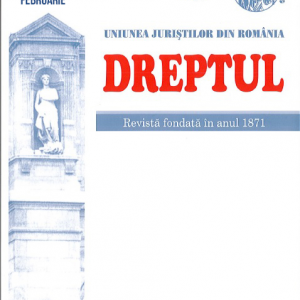 This article investigates how the postcommunist Romanian political regime was defined, with particular emphasis on the settlement of legal conflicts of a constitutional nature through the decisions of the Constitutional Court. Through this research we aim to identify the successive incarnations of the political regime, having as a reference the dynamics of the postcommunist Romanian political regime in relation to the continuous and varied relationship of the forces of political actors, as well as to the way in which they interpret and apply the constitutional norms. The originality of this research lies in the fact that in the analysis of the Romanian political regime we will combine the normative-institutional perspective with the perspective of the political and institutional practice, in order to obtain a complex picture, overall, on the way of formation and articulation of the Romanian political regime. The article highlights a permanent evolution of the political regime in relation to the continuous and varied relations determined by the forces relations of the political actors, as well as by the way in which the constitutional rules are interpreted and applied by them. The intrusion into the Constitutional Court’s jurisprudence in settling legal conflicts of a constitutional nature confirms the analysis of the political scientist Giovanni Sartori, according to which the alternation of the nature of the post-communist Romanian political regime is determined by the political and institutional practice built in relation to the political relationship between the president and the parliamentary majority. Defining the nature of the Romanian political regime helps us to understand the dynamics and frequency of constitutional crises
This article investigates how the postcommunist Romanian political regime was defined, with particular emphasis on the settlement of legal conflicts of a constitutional nature through the decisions of the Constitutional Court. Through this research we aim to identify the successive incarnations of the political regime, having as a reference the dynamics of the postcommunist Romanian political regime in relation to the continuous and varied relationship of the forces of political actors, as well as to the way in which they interpret and apply the constitutional norms. The originality of this research lies in the fact that in the analysis of the Romanian political regime we will combine the normative-institutional perspective with the perspective of the political and institutional practice, in order to obtain a complex picture, overall, on the way of formation and articulation of the Romanian political regime. The article highlights a permanent evolution of the political regime in relation to the continuous and varied relations determined by the forces relations of the political actors, as well as by the way in which the constitutional rules are interpreted and applied by them. The intrusion into the Constitutional Court’s jurisprudence in settling legal conflicts of a constitutional nature confirms the analysis of the political scientist Giovanni Sartori, according to which the alternation of the nature of the post-communist Romanian political regime is determined by the political and institutional practice built in relation to the political relationship between the president and the parliamentary majority. Defining the nature of the Romanian political regime helps us to understand the dynamics and frequency of constitutional crises -
 The practice of the constitutional jurisdiction court points out that the exercise of the constitutionality control does not lead only to the ruling of some simple solutions, by which the criticized text or texts of the law are found to be or not in compliance with the rules of the Fundamental Law. The complexity of this control, in close connection with the growing complexity of the regulations, but also with the desideratum of legal security, which must be equally considered in exercising the constitutionality control, makes that the solutions of the Constitutional Court be also expressed in different forms. This study makes an analysis of the decisions of the Constitutional Court pertaining to the category circumstantiated by the term „interpretative decisions”, in order to emphasize their importance and their role in the process of constitutionalization of law. Certainly, the achievement of constitutionality control involves, in itself, a process of interpretation and comparison of the constitutional rules and, respectively, of the infraconstitutional ones. Within the interpretative decisions, however, this comparative examination has a greater complexity, constituting an emphasis of more possible interpretations and the identification of the one which complies with the provisions of the Constitution. Such an analysis also raises for discussion the role of the Constitutional Court in the process of interpretation of the legal infraconstitutional rules, an interpretation facilitated by the provisions of the Fundamental Law, its basis and the limits of the jurisdiction of the Court.
The practice of the constitutional jurisdiction court points out that the exercise of the constitutionality control does not lead only to the ruling of some simple solutions, by which the criticized text or texts of the law are found to be or not in compliance with the rules of the Fundamental Law. The complexity of this control, in close connection with the growing complexity of the regulations, but also with the desideratum of legal security, which must be equally considered in exercising the constitutionality control, makes that the solutions of the Constitutional Court be also expressed in different forms. This study makes an analysis of the decisions of the Constitutional Court pertaining to the category circumstantiated by the term „interpretative decisions”, in order to emphasize their importance and their role in the process of constitutionalization of law. Certainly, the achievement of constitutionality control involves, in itself, a process of interpretation and comparison of the constitutional rules and, respectively, of the infraconstitutional ones. Within the interpretative decisions, however, this comparative examination has a greater complexity, constituting an emphasis of more possible interpretations and the identification of the one which complies with the provisions of the Constitution. Such an analysis also raises for discussion the role of the Constitutional Court in the process of interpretation of the legal infraconstitutional rules, an interpretation facilitated by the provisions of the Fundamental Law, its basis and the limits of the jurisdiction of the Court. -

-
 The judicial practice, including that of the Supreme Court, reveals difficulties in applying the sanction of nullity, in particular in case of virtual nullities. In this context, the author shows that it is necessary an applied analysis of the theory of nullity, in order to establish a staging of the judicial approach undertaken for applying this sanction. An interdisciplinary approach for the purpose of establishing the role of the condition of injury in such approach contributes to the avoidance of the confusion of the virtual nullity with the relative one.
The judicial practice, including that of the Supreme Court, reveals difficulties in applying the sanction of nullity, in particular in case of virtual nullities. In this context, the author shows that it is necessary an applied analysis of the theory of nullity, in order to establish a staging of the judicial approach undertaken for applying this sanction. An interdisciplinary approach for the purpose of establishing the role of the condition of injury in such approach contributes to the avoidance of the confusion of the virtual nullity with the relative one. -
 The study under the heading above reviews the relationship between the European Parliament and national parliaments of the 27 EU Member States (including, where appropriate their regional parliaments) in the light of provisions brought under the Treaty of Lisbon (effective since December 1st, 2009).
The study under the heading above reviews the relationship between the European Parliament and national parliaments of the 27 EU Member States (including, where appropriate their regional parliaments) in the light of provisions brought under the Treaty of Lisbon (effective since December 1st, 2009). -
 By comparison, the author examines the role of national parliaments in the treaties establishing the European Communities, the European Union (subsequent to the Treaty of Amsterdam), and then, much more in detail, the role of national parliaments in the Treaty of Lisbon (effective since 1 December 2009). At the end, the author examines the (indirect) influence of the Treaty of Lisbon on the legislative deliberative process in the Parliament of Romania.
By comparison, the author examines the role of national parliaments in the treaties establishing the European Communities, the European Union (subsequent to the Treaty of Amsterdam), and then, much more in detail, the role of national parliaments in the Treaty of Lisbon (effective since 1 December 2009). At the end, the author examines the (indirect) influence of the Treaty of Lisbon on the legislative deliberative process in the Parliament of Romania. -
 By comparison, the author examines the role of national parliaments in the treaties establishing the European Communities, the European Union (subsequent to the Treaty of Amsterdam), and then, much more in detail, the role of national parliaments in the Treaty of Lisbon (effective since 1 December 2009). At the end, the author examines the (indirect) influence of the Treaty of Lisbon on the legislative deliberative process in the Parliament of Romania.
By comparison, the author examines the role of national parliaments in the treaties establishing the European Communities, the European Union (subsequent to the Treaty of Amsterdam), and then, much more in detail, the role of national parliaments in the Treaty of Lisbon (effective since 1 December 2009). At the end, the author examines the (indirect) influence of the Treaty of Lisbon on the legislative deliberative process in the Parliament of Romania. -
 The correlation between parliament and democracy is a classical one. It has been proven not only by the beginnings of parliamentarism, related to limitation of the omnipotence of the monarch, but also by subsequent developments, especially in the generalization of universal suffrage, but also by the historical experience of the previous century, when the collapse of totalitarian or authoritarian regimes has always been followed by the return to parliamentarism or to a political system in which Parliament’s role is essential. After joining the European Union, its role was enhanced by its involvement in the European decision-making process.
The correlation between parliament and democracy is a classical one. It has been proven not only by the beginnings of parliamentarism, related to limitation of the omnipotence of the monarch, but also by subsequent developments, especially in the generalization of universal suffrage, but also by the historical experience of the previous century, when the collapse of totalitarian or authoritarian regimes has always been followed by the return to parliamentarism or to a political system in which Parliament’s role is essential. After joining the European Union, its role was enhanced by its involvement in the European decision-making process.
